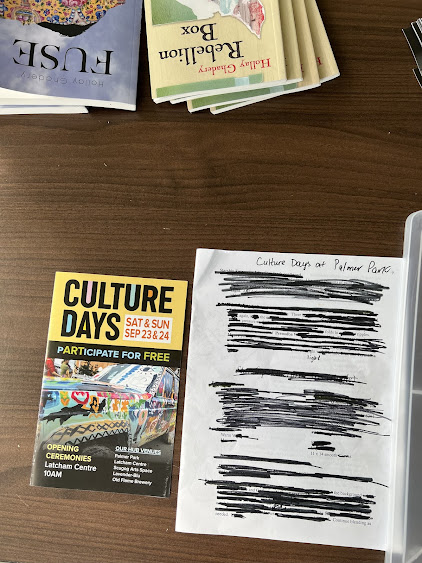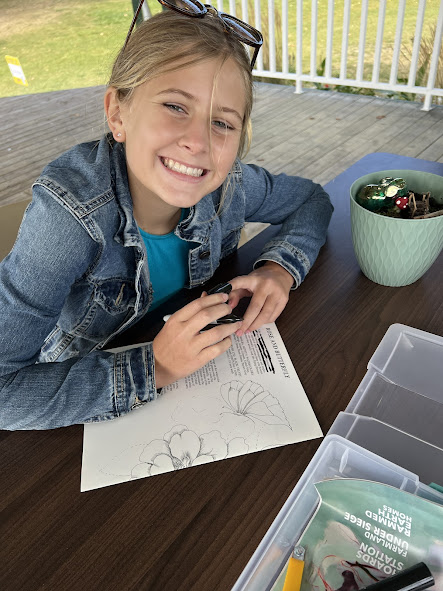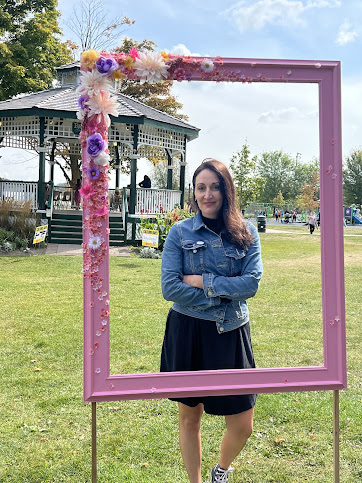Rebellion Box, Hollay Ghadery
Radiant Press, 2023
Hollay Ghadery’s debut poetry collection, Rebellion Box, takes the shape of a poetic container that encapsulates so many wonderings. It includes posed questions—sometimes with unanswered responses—to thoughts around the social limitations that have been oppressively placed on gender, identity, motherhood, race, and even mortality and the passage of time itself. The poet wonders why the rich chaos of possibility has been erased in favour of more limiting forms.
Historically, rebellion boxes were carved by rebel prisoners in Upper Canada during the 1837 Rebellion. Ghadery’s title poem is a love poem written by Joseph Gould to Mary—the girl he loves—with letters sent from Joseph through to Mary’s mother. In the poem, Joseph says: “Tell Mary I think of her often. It can hurt/to think of myself like this: all stone and soot, but rest/assured my present circumstance is not finite.” Through his incarceration, he warmly recalls better times that were spent with Mary and her parents, clearing land for their farm. While incarcerated, Joseph writes about having been stung by some bees, but says that the very thought of Mary dressed in blue “was something else to think about” to distract him from the pain. He parallels it to his situation in prison, of being trapped and wanting to escape.
This notion, of finding beautiful things or memories to lift us up when we’re struggling in our lives, is found in several poems throughout the collection, but it is also the metaphor and symbol of the rebellion box that contains the wide and wonderful universe of Ghadery’s well-crafted poems. Here is a literary and poetic container into which a person can confide their worries, curiosities, and philosophical questions. Even if they are not answered, the questions—and their various potential answers—are kept safe inside the box from the start to the end of a person’s life.
Ghadery’s exploration of how a woman evolves as she ages is clearly established in the voice that is presented in Rebellion Box’s very first poem, “Postcard, Santa Maria,” in which the speaker considers how they have changed over time. To begin, there is the image of a young girl, “Stretched/to indifference,” and then there is a noticed evolution into adulthood as the speaker says, “I’m not that girl/anymore,” but who now is a mother of four children. In “Mom,” the speaker reflects on their changed identity, trying to sort out what they have morphed into, trying to find themselves in this new role as mother: “Coming and going/I’m all the same/to you. An/umbilical tug,” In “Psychomachia,” the searching for self continues: “I’ll never feel/like my old self again,” and “I can’t//picture a wall free of fingerprints,” leaving the speaker to reflect on their “milk-stained existence.” The aspects of what has traditionally defined them have changed.
A long poem with a strong, meditative tone, “Psychomachia” stretches out over a few pages, echoing the speaker’s journey to becoming a wife and mother, demonstrating the ways in which a child can be both a “black hole” as well as a bright spirit who is “blinking/sparks” and “slingshot/smiles,” speaking of the paradoxes of how women might evolve as they become mothers. Here is a contemplation of what it means to have achieved what was dreamt of—having children—but also having to then balance and renegotiate (or even rediscover) who the speaker has become over time. It’s a tricky balancing act on a highwire some days, this life, and there are references to how the speaker deals with their mental health and wellness challenges –as well as their evolving sense of identity--throughout the poems. How do you define yourself after you become a mother? Do you protect your inner sense of self, or accept and lean into this new being you’ve become once you’ve had children? How do you redefine yourself, and what do you do if you think you might have lost yourself in the process of transformation?
The thread of how we balance our lives in terms of mental health and wellbeing also runs through the collection. In “Cosmic Script,” a love poem between mother and daughter, the speaker references the idea that “darkness/is just the absence of light” and alludes to the wonder and beauty of comets: “Who knows where they go/Who knows what they see.//It could be anything,” ending with an acceptance of uncertainty in the phrasing “It’s okay not to know for sure.” In “Apeirophobia,” there is once again a reference to needing to find calm by accepting things and living in the moment: “you prefer/the past—it’s predictable, and/in it you have infinite life to live.” In “Runaway Universe,” the speaker asks the reader: “Do you realize, I wonder, what submerged/identities we women can have?” and suggests that the “restraints of civilization” stop us from exploring the universe’s possibilities. This sense of discordance dances through Rebellion Box and is the catalyst to get the reader thinking about how they relate to—but also connect with—the ways in which a woman’s life shapeshifts over time. We don’t notice it until we look back, long for the past, or think of how things have changed over the years.
Rebellion Box is a book of poems that both contains and protects things, broaching topics that are both difficult and challenging, but which also allows the poet—and the reader, by extension—to be vulnerable and open to poems that are raw, honest, and realistic. Ghadery also references the various wonders and ‘glimmers’ of the world—including babies and children—and aligns them with references that conjure evocative images of skies, stars, and weather patterns and systems. The poet, in creating this strong imagistic thread, uses her craft to lace the poems in Rebellion Box together in a cohesive way.
As we live it, life does not offer clearly laid out paths. Our initial intentions, so often imagined in our younger years, tend to shift as we gain experience. Looking back can lead to nostalgia, but it can also offer a growing awareness of beauty and wonder if we live more mindfully in today’s world. We continually try to figure out where we have come from, and who we have become through the process of living. There, in a woman’s journey of shapeshifting identity—Ghadery seems to be suggesting—is where the poetry and magic resides, if only we care to look closely enough to see it.
Kim Fahner lives and writes
in Sudbury, Ontario. Her latest full collection of poems is Emptying the
Ocean (Frontenac House, 2022) and she's just published a poetry chapbook, Fault
Lines and Shatter Cones (Emergency Flash Mob Press, 2023). She is the First
Vice-Chair for The Writers' Union of Canada (2023-25), a member of the League
of Canadian Poets, and a supporting member of the Playwrights Guild of Canada.
Kim's first novel, The Donoghue Girl, will be published by Latitude 46
Publishing in Fall 2024. She may be reached via her author website at
www.kimfahner.com







